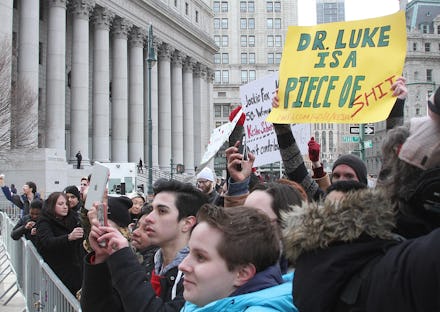What the Strength of the #FreeKesha Movement Means for Pop's Future

When Kesha left the courtroom Friday after squaring off with her producer and alleged abuser Lukasz Gottwald, better known as Dr. Luke, her face told the world everything it needed to know.
She had gone in seeking to be released from her contract with Sony and Dr. Luke, whom she accused back in October 2014 of drugging her, raping her and abusing her emotionally and physically throughout her career. Her contract still requires her to release six more albums, and a New York Supreme Court justice has condemned her to continue.
New York Supreme Court Justice Shirley Kornreich rejected Kesha's request for a preliminary injunction to allow her to record music independent of him while the rest of the abuse case plays out in court. A BuzzFeed reporter tweeted, Kornreich ruled there's been "no showing of irreparable harm" toward Kesha. The judge even added, "My instinct is to do the commercially reasonable thing," according to the Hollywood Reporter.
Pausing for a moment to reflect on how jarringly cold it is to read phrases like "no showing of irreparable harm" or "commercially reasonable" in a case brought by a woman who claims she was drugged and raped, it's clear the decision is a huge roadblock for the pop superstar. Two things happened next: Kesha very publicly broke down in court, and within minutes of the ruling, the #FreeKesha movement exploded.
Read more: Reaction to Kesha's Rape Allegations Prove Sexism Is Alive in Music — Look at Chris Brown
Since Friday, #FreeKesha has been among the top-trending hashtags on Twitter, dominating the national pop culture conversation online while a corresponding Change.org petition grabbed more than 230,000 signatures in 48 hours and continues to grow. This level of online chatter is rare, and it speaks volumes for the future of this case, the music industry and our country's conversations around sexual assault as a whole.
There are at least three things to take away from what appears to be a formidable fan-driven movement.
1. The public is overwhelmingly on Kesha's side.
It's one thing to get a hashtag trending; it's another to have it trend for 72 hours straight and draw support from music fans around the globe.
While approximately 100 fans gathered outside the courtroom on Friday to support Kesha, millions of fans are speaking out online. The viral petition grew from zero signatures on Friday at 3 p.m. Eastern, to more than 230,000 signatures by Monday afternoon.
That type of traction on an online petition is extremely rare. Like, we're talking winning the Powerball rare. Sure, lots of petitions have compelling stories and can attract hundreds of thousands or even millions of signatures. But to do so in less than three days? That's a unicorn in the land of social change, and a tell-tale sign that there is a really engaged fan community not only paying attention, but invested in taking action.
That it's a petition calling for a boycott of Sony is even more interesting, given that boycott asks in online petitions (anecdotally) tend to be among the hardest to sell to potential signers.
2. The national current on the topic of sexual assault is changing.
Over the past five years, countless examples have emerged of victims of sexual assault and their advocates shining light on systemic and often gruesome injustices. From individual cases such as Steubenville, to the innovative strategies advocates are taking to use Title IX laws to prevent sexual assault on campuses, to the women and men fighting for legislation to protect victims of revenge porn online, we're arguably at a new national tipping point on the issue of sexual assault in the United States.
There's still worlds to go, of course, and Kesha's celebrity status certainly gives her story a channel for exposure that many victims do not have. But the rose-colored glasses are starting to come off, and there's a real momentum and push to reform industries where sexual assault has thrived under-the-radar — from the military to Hollywood to the music industry and beyond.
3. This story won't go away, not for Sony or Dr. Luke.
Kesha fans aren't the only folks engaged in this story. The pop music community has come together in pretty unprecedented ways to show support for Kesha. We're talking some of pop's biggest stars who regularly explode the charts, as well as pop stars with a deep history working with and for Dr. Luke.
Lady Gaga, Lily Allen, Haim, Miley Cyrus, Ariana Grande, Lorde, Janelle Monáe, Demi Lovato and Sara Bareilles (to name just a few) have been vocal on Twitter in their support for Kesha. Kelly Clarkson, whose 2004 blockbuster "Since U Been Gone" was co-written by Dr. Luke, offered this roundabout not commenting on Dr. Luke's character. "Trying 2 not say anything since I can't say anything nice about a person," Clarkson tweeted, responding to a tweet from Best Coast calling the ruling "bullshit." "So this is me not talking about Dr. Luke." Late Sunday word came that Taylor Swift was donating $250,000 to support Kesha's legal fees.
Interestingly enough, Lady Gaga is slated to perform "Til It Happens to You," a song dealing with sexual assault, at the Oscars Sunday. Gaga said the song's narrative was driven by a rape she experienced as a 19-year-old struggling artist, People reported. Perhaps there's a moment to raise the #FreeKesha hashtag during that performance.
In short, #FreeKesha is now a movement — a movement of fans, of casual listeners of Kesha's music, of global pop music powerhouses. Even people who can't stand the earworms of "Tik Tok," "Blow" or "We R Who We R," who just want to see the music industry take itself more seriously when it comes to the subject of alleged sexual assault have lent their support.
This groundswell is something Sony ignores at its peril. Millions of fans are now paying attention, and #FreeKesha is far more than just a transactional weekend hashtag.